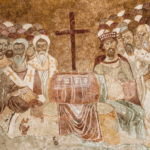This article contains some spoilers.
If you are a Star Wars fan, you probably already know about Disney’s sleeper hit series Andor which concluded its second (and final) series a few weeks ago. As a prequel to the movie Rogue One, Andor traces the story of the Rebel Alliance from its earliest stages through to the intelligence breakthrough that finally allows Luke Skywalker to destroy the Death Star in Star Wars Episode IV: A New Hope.
The show was only about three or four weeks old back in 2022 when I stumbled onto it with my son. We immediately knew that we were watching something special—and something very different from the Star Wars of recent decades. The settings and tone were grittier. The character motivations were more complex. The cost of rebellion, and its moral ambiguity, felt real. Somebody had tried to take Star Wars seriously.
As a prequel to a prequel, Andor was released without much fanfare or expectation. It was overshadowed by more hullabalooed (and sometimes just booed) series such as Obi-Wan, Ahsoka and The Acolyte. Some who did watch the series complained that it was too slow. Others protested the absence of standard tropes—how could it be Star Wars without Jedi, Sith, the Force, or a cataract of briefly sampled alien worlds?
Growing Acclaim
But time has vindicated the show with a growing audience and critical acclaim. Andor has proven that there can be a Star Wars for grown-ups. It offers a new hope for the generation that grew up with the original trilogy but found the prequel movies too childish. It also appeals to those who, as children, did enjoy the prequels but are old enough to want more. Andor’s writer and showrunner, Tony Gilroy describes the contrast with the old Star Wars well, when he says that Andor is about protein rather than icing. Andor is a triumph of writing, acting, world-building, cinematography and a thousand subtle gestures. Andor trusts its audience to read its subtext and to see the nuances of its character development.
Also, remarkably for a modern Disney show, it allows us to think for ourselves rather than beating us over the head with doctrinaire messaging. Andor tells the story of a revolution, and lesser producers might have wanted to turn the story into a cypher for contemporary politics. Some viewers have been unable to resist that temptation. But Andor‘s themes are universal. We might allow that the show depicts a fight against a sort of “fascism” (if loosely defined as authoritarianism) but that’s about it.
Masterful Monologues
The show is built around speeches, often dazzling moments of monologue. For example, revolutionary Luthen Rael (Stellan Skarsgård) laments:
I’m condemned to use the tools of my enemy to defeat them. I burn my decency for someone else’s future. I burn my life to make a sunrise that I know I’ll never see.
A major turning point in the second season comes as stateswoman Mon Mothma (Genevieve O’Reilly) denounces Emperor Palpatine in the Senate:
The distance between what is said and what is known to be true has become an abyss … When truth leaves us, when we let it slip away, when it is ripped from our hands, we become vulnerable to the appetite of whatever monster screams the loudest.
Partisan Dreena of Ghorman (Ella Pellegrini) issues a last radio transmission that echoes the desperate broadcasts of 1956 Budapest and 1968 Prague. If you want a taste of what the show becomes, an excerpt of that moment will provide it:
There are many other examples I could give.[1] The speeches of Andor are weighty—almost too weighty for Star Wars. But they are doing what all good myth and fantasy does: they allow us to see and feel realities that our jaded senses have lost.
A Rebellion Built on False Hope
Unfortunately, myths don’t always provide solutions. One of the most significant speeches is a manifesto delivered by a young revolutionary (Nemik), modelled on a young Trotsky. Nemik’s words are repeated several times as the story goes on—becoming a rallying cry, and also an ideological defence:
There will be times when the struggle seems impossible. I know this already. Alone, unsure, dwarfed by the scale of the enemy.
Remember this, Freedom is a pure idea. It occurs spontaneously and without instruction. Random acts of insurrection are occurring constantly throughout the galaxy. There are whole armies, battalions, that have no idea that they’ve already enlisted in the cause.
Remember that the frontier of the Rebellion is everywhere. And even the smallest act of insurrection pushes our lines forward.
And remember this: the Imperial need for control is so desperate because it is so unnatural. Tyranny requires constant effort. It breaks, it leaks. Authority is brittle. Oppression is the mask of fear.
This is wonderfully moving and expresses profound truth. Tyranny is unstable; the human drive for autonomy is spontaneous. But it is not at all obvious that there is anything natural or pure about freedom as a positive concept. Andor shows us the divisions and disagreements that exist between different rebel factions: some want anarchy; some want to partition the Galaxy; some aren’t even thinking that far ahead. At the start of season two, we witness a stupid and murderous power struggle within a group of neo-republicans. By the end of the same season, the largest rebel alliance has turned its back on its former leader.
All this shows that freedom is not a word or reality that comes to us “without instruction”. Such a notion might make for a nice callback; it might appeal to contemporary Westerners who want to fight for truth and justice without having to interrogate their own assumptions. It fits with another refrain in the series that “rebellions are built on hope.”
And yet false hope is dangerous. Real revolutions are terrible and bloody and rarely lead their people to lasting freedom. Secular revolutions are some of the worst. Without a sense that human worth comes from God, the calculus of lives sacrificed for gains achieved goes south fast. Without a sense of universal depravity, it is too easy to underestimate the difficulty of building a fairer society out of the blood-soaked rubble. When belief in providence and eschatological justice fade, desperation and impunity lunge for the reins.
I love that Andor is a good enough show to occasion a discussion of these things. I love that its storytelling is so good that it undermines the closest thing it provides to a solution. The question of what happens after the revolution has always been a problem. If we haven’t noticed it from our own history, Andor shows us that it was also true a long time ago, and in a galaxy far away.
Hope from Beyond
In the end, even Andor can’t help reaching for something more. In episode seven of the second season, the eponymous hero Cassian Andor finally meets a woman with Force awareness—not a Jedi, just a cook with some healing powers. As she tends to his wounds she tells him what she senses about him: that the events that have shaped him are not accidental: “They’re gathering … There’s a purpose to it. There’s some place he needs to be.”
Cassian shrugs it off, but the audience, aware of what’s to come, knows she must be right. There is Something or Someone at work behind the scenes. There is Someone who has been shaping events for a good purpose, despite all the destruction and evil and misery. Another character suggests that whatever it is might be important; that Cassian should “let it in.” There is no indication either in Andor or Rogue One that he does that. But I love that the story lifts the veil, even if it’s just for a moment. I am grateful that the storytelling instincts of Gilroy and his team were sharp enough to see that we need a different sort of hope.
Of course, none of this is to suggest that Andor is any sort of Christian story. The Force is far too vague a thing to be identified with any faith. And yet Andor’s grand fiction tells many true things about the richness and complexity of being human. It is humane in the best sense. It encourages us to wake up and resist evil. It tells us that our lives run parallel to a greater purpose that will prevail in the end.
That’s the sort of hope we need today, too.
The original version of this article was published on Andrew Moody’s blog.
[1] Maarva Andor, spurring the workers of Ferrix into rebellion with a recorded speech at her own funeral. Prison capo Kino Loy (Andy Serkis), grasps for words as he exhorts the zeks of Narkina 5 to revolt.















